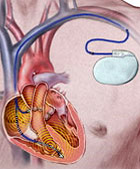Health Topics
-
Healthy Living
-
|
| |
| Wireless Implantable Cardiac Devices |
| Dr Rabin Chakraborty
|
 |
Did you know that of all deaths in the world, 20 percent are unexpected – of which majority are cardiac? Reports further elucidate that 50 percent of Sudden Cardiac Deaths are due to heart attacks, while the other 50 percent are caused by disturbances in the rhythm of the heart. |
|
Scary!! But, you may still heave a sigh for most of these cardiac dysfunctions are now preventable! Wireless Implantable Cardiac Devices are a case in point. Implanted in patients with serious cardiac rhythm abnormalities, the Intracardiac Cardioverter Defibrillator (ICD) monitors the heart beat and in case of irregularities, sends corrective electric shocks to bring the heart back to its normal throb. And that is not all – technology has ushered in ICDs even more advanced and effective in preventing Sudden Cardiac Death (SCD). The device is a boon for patients with history of ventricular arrhythmias or of resuscitated cardiac arrests and with low ejection fraction with high risk of sudden death. |
| |
| Advantages |
- Conexus Wireless telemetry: No matter where the patient is, data can be transmitted over the telephone and the Cardiac Electro physiologist can programme it remotely.
- Optivol fluid Status Monitoring: Patients with low ejection fraction have a tendency to cardiac failure and fluid accumulation in lungs leading to serious medical crisis, which needs intensive therapy in most cases. This device prevents such emergencies by giving indications of impending fluid accumulation as early as three weeks before the patient experiences any symptom.
- Pain free strategy for shock reduction: It has a feature that automatically uses pacing pulses to painlessly stop fast, dangerous heartbeats, while concurrently preparing to deliver a shock if needed, with no delay.
- Managed ventricular pacing: It allows doctors to dramatically reduce unnecessary pacing to the right ventricle, thereby reducing the risk of persistent AF.
- Automaticity with Complete Capture Management: It provides patients’ safety by continuously and automatically adjusting to changing patient needs and reduced battery drain.
|
For the first time, doctors have access to sophisticated defibrillators with complete automaticity to capture what is happening inside the heart. However, more significant than the technological capabilities, it is the device’s ability to make a remarkable difference in the patients – an apparent edge over many other technological wonders in its league. The assurance that patients can reach their doctor, no matter where they are, confers a peace of mind that is simply unsurpassed: heart-felt care to the ones who need it the most. |
| |
|
Dr Rabin Chakraborty is Senior Consultant Interventional Cardiologist & Electro physiologist at Apollo Gleneagles Hospitals, Kolkata.
|
| |
|